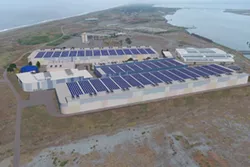
Unanimous vote clears major hurdle for Nordic Aquafarms
The proposed Nordic Aquafarms California fish farm project on the Samoa Peninsula lurched forward Aug. 28 as the Board of Supervisors, at the end of a nine-hour meeting, voted unanimously, with Fifth District Supervisor Steve Madrone absent, to reject an appeal of the project’s environmental impact report and grant the company three necessary permits. But the board’s action came with some conditions: The company must produce an annual “sustainability report” to track its greenhouse emissions — including those caused by fish food consumption and its fleet of delivery trucks — and it must hold an annual forum to discuss issues that have arisen during the year, while donating a minimum of $25,000 yearly to an “appropriate community project.” In addition, the project’s construction must proceed in two phases, and the second phase cannot begin until the first — which includes cleaning and remediating the polluted site it will occupy — is satisfactorily completed. Nordic aims to raise Atlantic salmon in a huge land-based facility to be constructed on the site of an abandoned pulp mill, which is heavily polluted and which Nordic has committed to clean up before beginning construction. All the fish will be raised from eggs in land-based tanks, and will not come into contact with either Humboldt Bay or the Pacific Ocean at any point in their life cycles, according to Nordic, which says numerous safeguards are in place to prevent fish escape. Wastewater will be cleansed and purified before being released into the ocean through an existing outfall pipe that extends 1.5 miles offshore. Two-and-a-half million gallons per day of fresh water will be supplied by the Humboldt Bay Municipal Water District, and 10 million gallons per day of salt water will be filtered and taken from the Humboldt Bay. The project, if and when completed, will be the largest in the world, producing 25,000 tons of salmon each year. Nordic has already built smaller facilities in Europe and is also trying to build another large facility in Maine. The Final Environmental Impact Report (FEIR) for the giant fish farm had been approved in August by the Humboldt County Planning Commission. At that time, the commission also recommended that the Board of Supervisors grant the necessary permits and certify that the environmental report was adequate and complete. This decision was appealed by three citizens’ groups: Humboldt Fisherman’s Marketing Association, the Redwood Regional Audubon Society and 350…

